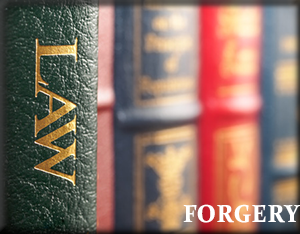 Forgery Can Get You into Big Trouble in Oklahoma
Forgery Can Get You into Big Trouble in Oklahoma
Forgery is more than just signing your parent’s name to a school permission slip that you had forgotten about. In Oklahoma, forgery in most cases is a felony. Forgery most often involves either making, altering or signing a document, either financial or otherwise, with the intent to commit fraud.
Alternatively, forgery can be the use or presenting of a forged document or financial instrument with the intent to defraud. Whatever the method or document by which forgery is alleged, a conviction for forgery in Oklahoma requires the intent to deceive or defraud.
Here are the main types of forgery recognized in Oklahoma criminal statutes:
Types of Forgery
- Forgery of Court Documents: This involves knowingly signing the name of another without consent on a court document with the intent to mislead the court. The crime is punishable by a jail term of up to six months, a fine of up to $500, or both. Okla. Stat. tit. 21 § 464
- Forged Wills, Trusts, or Deeds: Forging or altering any will, codicil, trust, deed or supporting documents which changes the way real property is held, done with the intent to defraud, is considered forgery in the first degree. Okla. Stat. tit. 21 § 1561
- Forged Stock Certificates or Securities: Likewise, forging or altering, with intent to defraud, any public security, certificate of stock, or other financial instrument issued by the state of Oklahoma, is considered forgery in the first degree. Okla. Stat. tit. 21 § 1562
- Forging State, Public Court, or Corporate Seals: The forging or counterfeiting of the state seal or other governmental seal on a document, done with intent to defraud, constitutes forgery in the second degree. Okla. Stat. tit. 21 § 1571
- Forging Other Records: This crime is committed by falsely altering, destroying, corrupting, or in any other way falsifying any record of a will, codicil, or other document of conveyance which is evidence, any record of a court judgment, or the return of an officer or court to a process of the court. The crime constitutes forgery in the second degree. Okla. Stat. tit. 21 § 1572
Likewise, erasing any portion of a document that affects an interest in property is forgery in the same degree as making any false change to that writing. Okla. Stat. tit. 21 § 1624 - Forgeries in Book of Record or Abstract: Forging or making material changes to an entry in any book of records or on a supporting record constitutes forgery in the second degree. Okla. Stat. tit. 21 § 1573
- Forgery of Certification or Acknowledgement of Conveyance: Any time an officer who is authorized to take an acknowledgement or proof of the conveyance of real property or other recordable property, knowingly and falsely certifies that such an acknowledgement or instrument has been certified, the officer is guilty of second degree forgery. Okla. Stat. tit. 21 § 1574.
- Forged Engraving Plates: Forging or counterfeiting engraving plates is second degree forgery in Oklahoma. These plates can be used for such things as promissory notes, drafts, checks, certificates of deposit (CDs), or other financial instruments. These plates are often sold to counterfeiters. Okla. Stat. tit. 21 § 1575
- Forged Coins: Counterfeiting any gold or silver coin of any country, with the intent to see, utter, or use them, is a chargeable as forgery in the second degree. Okla. Stat. tit. 21 § 1583
- Coin Forgery With Intent to Export: Likewise, it is considered to be forgery in the second degree to counterfeit any gold of silver coin with the intent to export them or allow them to be exported to injure or defraud any foreign government. Okla. Stat. tit. 21 § 1584
- Forged Tickets or Boarding Passes: Forging, altering, or counterfeiting a ticket, boarding pass, or any other writing that allows a person passage on a railroad or any other means of public transportation, or selling, trading, or exchanging any such writing is chargeable as forgery in the second degree. Okla. Stat. tit. 21 § 1587
- Forging Postage Stamps: Forging, counterfeiting, or altering postage stamps is also second degree forgery. Okla. Stat. tit. 21 § 1588
Penalties for Forgery in Oklahoma are Severe
Classifications of forgery include first, second, or third degree crimes.
First degree forgery, a felony, carries a prison term of 7 to 10 years.
Second degree forgery, also a felony, is punishable by a prison term of up to seven years.
In the third degree, the punishment depends on the monetary amount involved in the forgery. If the amount is less than $1,000, the crime is a misdemeanor and punishable by up to a year in jail and a fine of up to $1,000. If the amount involved is more than $1,000 or more than $2,000, the crime is a felony and you could spend up to seven years in prison. Okla. Stat. tit. 21 § 1621
All types of forgery carry the possibility of jail or prison time. Whether it is 6 months or 20 years, any period of incarceration is long and involves significant impacts on your future beyond the time spent incarcerated. When you are charged with forgery ,you need to get the best legal counsel available to protect your freedom and your future.
Strategy Session with a Tulsa Defense Lawyer
Don’t delay. Contact the Tulsa attorneys at Wirth Law Office. Your initial consultation is free.
Call Wirth Law Office – Tulsa’s criminal defense lawyers at 918-879-1681 or toll free at 1-888-Wirth-Law (1-888-947-8452).
You can also submit the question form at the top right of this page.




























